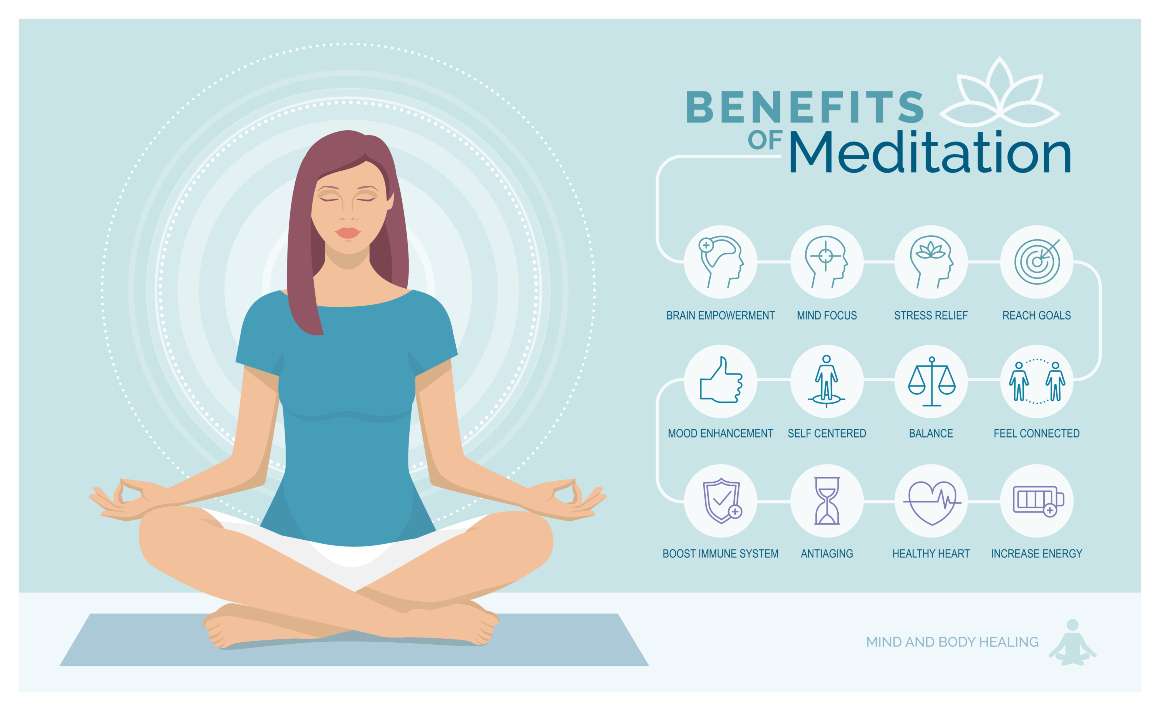Meditation Music : Positive Energy
Published:
Meditation music has become an essential component of mindfulness practices, helping individuals enhance their meditation experience and achieve a deeper sense of relaxation. It's essential to comprehend the scientific basis for the impacts of meditative music on our psychological health and prosperity as its fame keeps on expanding.
Contents:
- The Science Behind Meditation Music
- Effects on Emotion Regulation and Attention
- Improving Concentration Levels Through Music
- Choosing the Right Meditation Music
- Benefits of Using Music in Meditation Practices
- How to Practice Music Meditation Effectively
- Creating Your Own Meditation Music Playlist
- Meditation Music for Kids, Studying, and Anxiety Relief
- FAQs in Relation to Meditation Music
- Conclusion
- Best Youtube videos for Meditation Music
In this comprehensive guide, we will delve into how meditation music can impact emotion regulation and attention while improving concentration levels. We'll also discuss choosing the right type of music for your practice, incorporating soft tunes or familiar religious songs as needed.
Furthermore, you'll discover various benefits that come with using music in your meditation routine such as alleviating anxiety symptoms, promoting positive energy, and improving sleep quality. To ensure maximum effectiveness during your sessions, we will explore proper preparation techniques both physically and mentally along with breathing exercises specifically tailored for music mediation.
Finally, learn how to create your own personalized meditation music playlist by exploring different genres and styles suited to individual needs. We'll also touch upon the use of meditation music for kids studying and anxiety relief while examining healing through sound therapy and emotional restoration with these powerful auditory tools.

The Science Behind Meditation Music
Studies have shown that mindfulness meditation training can improve the experience of musical beauty while decreasing negative emotions during recognition and experience of calm music. In this section, we will explore how meditation music affects emotion regulation and attention, as well as its ability to improve concentration levels.
Effects on Emotion Regulation and Attention
Listening to calming tunes during meditation has been found to positively impact our emotional state by helping us regulate our feelings more effectively. According to a study published in Frontiers in Psychology, participants who underwent mindfulness-based stress reduction (MBSR) training reported an increased appreciation for beautiful melodies along with reduced negative emotions when listening to soothing tracks.
By engaging in mindful practices, individuals can gain better control over their thoughts and emotions, thereby increasing their receptiveness to positive experiences such as enjoying calming music during meditation. As a result, they become more receptive towards positive experiences like appreciating harmonious sounds while meditating.
Improving Concentration Levels Through Music
Apart from its influence on emotional regulation, meditation music also plays a crucial role in enhancing focus during mindfulness sessions. The slow tempo and gentle rhythms often found in these compositions help create an atmosphere conducive to relaxation, which subsequently allows practitioners to concentrate better on their breath or chosen object of attention.
- Ambient: Ambient music features minimalistic soundscapes without any prominent melody or beat structure. This genre provides a subtle background soundtrack ideal for deepening your meditative state without distraction (source).
- Nature sounds: Recordings of natural environments, such as rainforests or ocean waves, can transport listeners to serene settings that encourage relaxation and mental clarity.
- Instrumental pieces: Music without lyrics allows the mind to focus on the soothing melodies and harmonies instead of getting caught up in words or stories. Examples include classical compositions by composers like Mozart or contemporary instrumental tracks featuring piano, guitar, or flute.
Finding the right meditation music for your practice may require some experimentation with different genres and styles. The key is to select tunes that resonate with you personally while fostering a sense of calmness and concentration during your mindfulness sessions. Meditation music can include binaural beats, primordial sounds, gregorian chanting, and nature sounds. These can help reduce anxiety, relieve stress, and improve sleep. Incorporating music into your meditation practice can help you stay focused on the present moment and improve your mental health by regulating your mood and promoting positive emotions.
The science behind meditation music is an intriguing topic that can help us understand how sound and rhythm can influence our emotional state, concentration levels, and overall wellbeing. By selecting the right type of meditation music for a particular situation or mood, we can further enhance its effects on our mental health.

Choosing the Right Meditation Music
Meditation music plays a crucial role in enhancing your meditation experience. There is no one-size-fits-all type of music for meditation; however, soft tunes with slow tempos are generally considered best because they soothe the body and slow down thoughts. Familiar songs or religious-themed tracks may resonate well with some individuals depending on their personal preferences.
Soft/Quiet Tunes for Relaxation
To create an optimal environment for relaxation during meditation, it's essential to choose calming and soothing tunes that help you unwind. Soft melodies featuring instruments like piano, flute, or harp can be particularly effective in promoting tranquility and peace of mind. Some popular genres to explore include ambient soundscapes, nature recordings, and instrumental pieces.
Incorporating Familiar or Religious Songs
If you find comfort in familiar songs or have a strong connection to your faith, incorporating these elements into your meditation practice can enhance its effectiveness by evoking feelings of safety and spiritual connection. For Christians, hymns can provide a feeling of familiarity to help deepen the meditative state.
- Mantras: Mantras are repetitive phrases used as a focal point during meditation practices across various religions such as Hinduism and Buddhism. Chanting mantras along with appropriate background music can improve concentration levels while creating positive energy within oneself.
- Spiritual chants: Spiritual chants from different traditions like Gregorian chanting (Christian), Kirtan (Hindu), Zikr (Islamic), etc., provide a soothing and spiritual atmosphere that can help deepen your meditation experience.
- Religious hymns: Hymns from various religious backgrounds can evoke feelings of devotion, peace, and harmony during meditation sessions. These songs often have slow tempos and simple melodies which make them ideal for meditative purposes.
Incorporating familiar or religious music into your meditation practice is a personal choice that depends on individual preferences. Test out a variety of tunes until you identify the one that best resonates with you, enabling an atmosphere for tranquilness and self-exploration.
When choosing the right meditation music, it is important to consider both personal preferences and potential benefits. By exploring the advantages of incorporating music into a meditation practice, one can find an effective way to promote relaxation and wellbeing.
Benefits of Using Music in Meditation Practices
By incorporating music into your mindfulness practices, you can attain a deeper level of relaxation and presence. Some of the key advantages include:
Alleviating Anxiety Symptoms
Research has shown that meditation music can significantly reduce anxiety levels by activating the body's relaxation response. This is particularly helpful for individuals who struggle with chronic stress or anxiety disorders, as it helps calm their nervous system and promotes a sense of inner peace.

Promoting Positive Energy
Meditation music often features soothing melodies and harmonious sounds that evoke positive emotions like happiness, gratitude, and love. By incorporating these uplifting tunes into your practice, you can enhance your mood regulation abilities while fostering an atmosphere conducive to personal growth.
Improving Sleep Quality
A consistent meditation practice paired with relaxing music has been found to improve sleep quality. The combination helps relax both mind and body before bedtime, making it easier for individuals struggling with insomnia or other sleep disturbances to drift off peacefully at night.
Nature Sounds for Relaxation & Stress Relief
- Birdsong: Listening to birdsong creates a serene ambiance perfect for deep relaxation during meditation sessions.
- Ocean Waves: The rhythmic sound of ocean waves crashing onshore provides a soothing backdrop that encourages feelings of tranquility.
- Rainfall: The gentle patter of raindrops can help create a calming atmosphere, allowing you to focus on your breath and stay present during meditation.
By incorporating music into your mindfulness practices, you'll be able to reap the numerous benefits it offers for mental health and overall well-being. From alleviating anxiety symptoms to promoting positive energy and improving sleep quality, meditation music is an invaluable tool in enhancing your practice.
The benefits of using music in meditation practices are vast, ranging from alleviating anxiety symptoms to promoting positive energy and improving sleep quality. Now is the moment to acquire how to perform music meditation efficiently, taking into consideration the plentiful advantages it offers such as reducing stress levels and stimulating beneficial vibes while also improving sleep quality.
How to Practice Music Meditation Effectively
To facilitate a successful music meditation practice, it is essential to create an atmosphere of comfort and relaxation that allows for complete immersion. In this section, we will discuss how to prepare yourself physically and mentally for music meditation, as well as breathing techniques that can enhance your practice.
Preparing Yourself Physically & Mentally
Before beginning your music meditation session, take some time to ensure you are in a comfortable position. This may involve sitting on a cushion or chair with proper back support or lying down if preferred. Shut your eyes and let go of any tension in your body, from head to toe, for both physical comfort and mental relaxation. It's important not only for physical comfort but also mental relaxation since tension in the body can lead to stress and anxiety.
- Select a quiet space free of distractions.
- Choose a comfortable position - sitting or lying down.
- Close your eyes and relax all muscle groups.

Breathing Techniques During Music Meditation
In addition to finding physical comfort during music meditation, focusing on proper breathing techniques can significantly improve the overall experience. Inhaling and exhaling deeply with the diaphragm can facilitate a state of tranquility, supplying more oxygen to your bloodstream while simultaneously lessening HRV. As you listen intently on chosen tunes such as those found at Calm, make sure each breath is slow and steady; inhale deeply through the nose before exhaling gently out of the mouth ensuring every exhalation lasts longer than inhalations thus encouraging further calming effects throughout the body-mind connection.
- Focus on slow, deep breaths through the diaphragm.
- Inhale through the nose and exhale gently out of the mouth.
- Ensure exhalations are longer than inhalations for maximum relaxation benefits.
By following these guidelines, you can effectively practice music meditation and experience its numerous benefits. Start with a few songs initially before gradually increasing session duration to maximize your results over time. Remember that consistency is key - incorporating music meditation into your daily routine will help promote long-lasting positive changes in both mental and physical well-being. Research suggests that regular mindfulness practices such as this can lead to significant improvements in overall health outcomes including reduced stress levels, increased cognitive function, among others, so don't hesitate to give it a try today.
Customize your music meditation practice to maximize its potential for fostering inner peace and balance. By creating a personalized playlist, you can ensure that each session provides an optimal experience for relaxation and mindfulness.
Creating Your Own Meditation Music Playlist
Customizing a personal soundtrack for your meditation practice can be an effective way to address any number of issues, from anxiety and depression to stress or insomnia. With countless genres and styles available online, you have unique opportunities to discover what works optimally for you in any given situation - whether seeking relief from anxiety, depression, insomnia, stress or other common issues faced on a daily basis.
Exploring Different Genres and Styles
To create the perfect meditation music playlist, begin by exploring various genres and styles that resonate with you. Some popular options include:
- Ambient soundscapes
- Nature recordings
- Instrumental pieces (e.g., piano or guitar)
- Binaural beats or isochronic tones
- New age compositions
You can also explore different cultures' traditional meditative music such as Indian classical ragas or Tibetan singing bowls. No definitive answer exists when it comes to picking meditation music; what is essential is discovering sounds that can facilitate relaxation and concentration during your practice.

Tailoring Playlists to Individual Needs
Once you've explored various genres and styles, start creating your own meditation music playlist by selecting tracks that resonate with you personally. Consider the following factors when choosing songs:
- Length: Choose tracks of varying lengths so you can customize your meditation sessions according to how much time you have available.
- Mood: Select a mix of calming, uplifting, and introspective tunes to cater to different emotional states during meditation.
- Purpose: If you're meditating for a specific purpose (e.g., stress relief or sleep), include tracks that are specifically designed for those goals.
Create different playlists for various times and activities, such as morning meditation or bedtime relaxation, to find the ideal flow that boosts your practice. bedtime relaxation). Experiment with track order and combinations until you find the perfect flow that enhances your practice.
Incorporating personalized meditation music into your daily routine can significantly improve the quality and effectiveness of your mindfulness practice. By exploring various genres/styles and tailoring playlists based on individual needs/preferences, anyone can reap numerous benefits associated with incorporating soothing sounds into their meditative journey - from alleviating anxiety symptoms, promoting positive energy, improving sleep quality, and more.
Constructing a tailored audio compilation to use while meditating can be an efficient way of finding what works optimally for you. With that in mind, let's look at how different types of meditation music can be beneficial for kids, studying, and anxiety relief.
Meditation Music for Kids, Studying, and Anxiety Relief
Meditating while listening to calming tunes has been shown to alleviate anxiety symptoms among children. Additionally, meditation music can be used effectively for studying purposes by creating a relaxed environment that promotes focus and concentration on the task at hand.
Benefits of Meditation Music for Kids
Introducing meditation practices to children can help them develop healthy coping mechanisms early in life. By incorporating meditation music into their routine, kids may experience:
- Better emotional regulation: Soothing sounds can help children process emotions more effectively.
- Improved sleep quality: Calming melodies before bedtime create an ideal atmosphere for restful slumber.
- Increase in focus and attention span: Listening to relaxing tunes during quiet activities or homework sessions enhances concentration levels.
Using Meditation Music for Studying
Research suggests that background music with slow tempos can improve cognitive performance when engaging in complex tasks. To maximize the benefits of using meditation music while studying:
- Select instrumental tracks without lyrics as they are less likely to distract from the study material.
- Avoid high-energy genres like rock or electronic dance music since these might increase arousal levels rather than promote relaxation needed for focused learning experiences.
- Create personalized playlists based on individual preferences - some students may find classical compositions helpful whereas others might prefer ambient soundscapes or nature recordings.
By incorporating meditation music into daily routines, both children and adults can experience improved emotional well-being, enhanced focus during study sessions, and relief from anxiety symptoms. Meditation music can also be used as a part of mindfulness practices, such as Buddhist meditation, to help stay focused on the present moment. Explore various genres and styles, such as primordial sounds, binaural beats, nature sounds, and even Gregorian chanting, to find the perfect soundtrack for your meditation practice or music listening experience.
Exploring music for relaxation, concentration and calming of anxiousness can be a strong way to aid kids in dealing with the pressures of daily life. By exploring healing through meditation music, we can gain insight into how sound therapy can provide emotional support during difficult times.
FAQs in Relation to Meditation Music
Does Meditation Music Actually Help?
Yes, meditation music can be helpful in enhancing the overall experience of meditation. It has been shown to improve concentration levels, regulate emotions, and promote relaxation. Studies have found that listening to calming music during meditation can lead to increased focus and reduced stress levels. Research supports its effectiveness.
What Is the Purpose of Meditation Music?
The primary purpose of meditation music is to create an immersive environment that facilitates a deeper state of relaxation and mindfulness. It helps individuals achieve mental clarity by minimizing distractions, promoting emotional balance, and improving concentration. Additionally, it may enhance specific benefits such as anxiety relief or sleep improvement depending on the chosen tracks.
Why Is Meditation Music So Calming?
Meditation music often features slow tempos, soothing melodies, and minimalistic arrangements which are designed to evoke feelings of calmness and tranquility. These elements work together harmoniously to reduce brainwave activity, synchronizing neural oscillations, thereby encouraging a more relaxed state conducive for meditative practices.
How Is Music a Form of Meditation?
Music can serve as a focal point for attention during meditative practice by providing an auditory stimulus that guides one's awareness inwardly while simultaneously fostering emotional regulation. Research suggests that engaging with music in a mindful manner can lead to increased self-awareness, reduced stress, and enhanced well-being, making it an effective form of meditation.
Conclusion
In the end, evidence has indicated that listening to music for meditation can be advantageous in controlling emotions, improving focus and concentration, diminishing anxiousness signs and bettering sleep quality. By choosing the right type of music and practicing effective techniques such as breathing exercises, individuals can create their own personalized playlists for optimal benefits. Meditation music can also be used for kids, studying, anxiety relief, and even emotional healing.



















